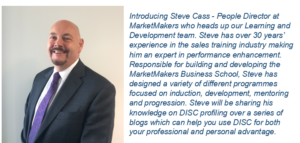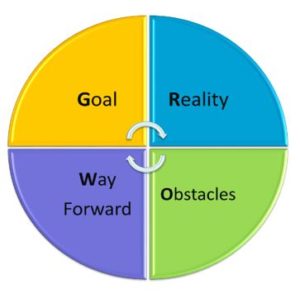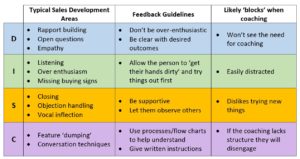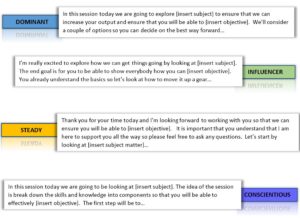Effective coaching with DISC

Well here we are again! In this blog, I would like to explore how we can use DISC profiling to increase the effectiveness of a key leadership skill- coaching. To do this we are going to use a classic tool known as the ‘GROW’ model.
GROW stands for; Goal, Reality, Obstacles and Way forward – you may know of alternative versions but this is my blog so we are going to use my version!

So let’s break it down to understand what each element actually means.
Let’s start with ‘Goal’ – There is no great surprise here as this part is designed to help us understand what is the behaviour or skill that we want to achieve after coaching.
Typical questions here would be:
- What do you want to be able to achieve?
- How will you know when this goal has been achieved?
- What would you like to be able to do?
- What is your timescale for achieving this goal?
Next up is ‘Reality’ – this part of the model is used to describe where the current level, or ‘reality’, of that desired behaviour or skill is. For example, not able to perform the skill at all, or perhaps only performing parts of the skill.
Typical questions here would be:
- What steps have you already taken to achieve your goal?
- What is your level of understanding at the moment?
- On a scale of 1–10 how would you score your ability to be able to [insert skill/behaviour] right now?
- What impact would achieving this goal have on your life/role?
Then we have ‘Obstacles’, which can also be referred to as ‘options’. This element is where we need to consider all the reasons why the desired behaviour or skill has not been achieved (or perhaps why previous actions have not been fully successful) plus what the different options or methods we use to achieve the goal.
Typical questions here would be:
- Why do you feel you have not been able to [insert goal/behaviour/skill] before now?
- What is likely to get in the way of being able to [insert goal/behaviour/skill]?
- What are the different ways open to you to learn this behaviour/skill?
- What do you need to stop/start to help you achieve your ultimate goal?
- What else could you be doing?
Finally we arrive at ‘Way forward’. It is at this point we create a plan on how the goal is going to be achieved. Typical questions here are:
- What do you need to do first?
- Where do you want to be by the end of the week?
- How are you going to ensure you keep motivated?
- If you experience an ‘obstacle’ (see previous element of the model) what will you do to overcome it?
- How often do we need to review your progress?
A nice little technique at this point is to get the person being coached to commit to the following;
- Will I do this?
- How will I achieve this?
- When will I be able to achieve this by?
So we have reached the point where we need to bring DISC into the equation and, as is usual, with each individual profile there are specific points to be aware of when it comes to coaching. As with previous blogs a table comes in handy here! Take a look at the table below for an overview you can use when coaching:

As these blogs build into a compendium of vital information for managing and influencing when it comes to coaching there is no finer way to change behaviour and enhance performance as the session can be truly tailored to the person’s individual DISC profile. When starting the coaching session it is important to gain the individual’s buy-in from the start so here are four great ways to ensure the person understands the reason for the coaching and it is motivating and engaging from the outset. Here they are;

So there we have it – coaching using DISC – of course, the difficulty with reading this blog is that it is not interactive, and when it comes to coaching despite what some people think (I’m talking about you “Dominant” guys here!) coaching is not telling somebody how to do something it is about engaging, sharing information and empowering others. So to finish I would like to share with you a few great quotes that I always like to keep in the back of my mind when coaching;
“The test of a great coach is that when they leave, others are able to carry on successfully”
“The best quality of a coach is the ability to ask questions and let the person come up with the answer”
“You get the best effort from others not by lighting a fire beneath them, but by building a fire within them”
Next time we are going to understand the best way to manage each specific DISC profile and perhaps even understand how to get people to do what we ask them to do – interested? – Then join me next time!
Tags: B2B Marketing, Coaching, DISC, DISC Profiling, Disc Profiling Blogs, Learning and Development, Learning styles

